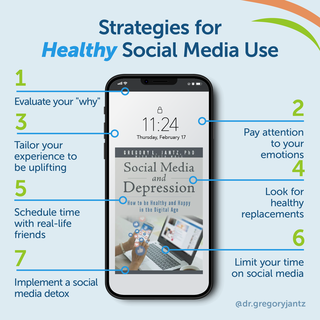Media
Strategies for Healthy Social Media Use
Despite dangers, social media can provide benefits.
Posted February 17, 2022 Reviewed by Vanessa Lancaster
Key points
- The redeeming benefits of social media are staying in touch with faraway family members or reconnecting with friends from the past.
- Having a well-developed engagement strategy with social media is important.
- You can avoid the perils of social media by incorporating discipline that includes scheduling time limits and time with real-life friends.
Despite the inherent downsides and dangers related to social media, it does offer many benefits. For example, you may use social media to stay in touch with faraway family members or reconnect with friends from the past. If you’re looking for encouragement and solutions to a challenge you’re facing, you can undoubtedly find some resources on social media. The benefits are real.
The challenge, of course, lies in finding healthy, balanced ways to enjoy some of the benefits without damaging your self-esteem, mental health, and real-life relationships in the process. Even with an intentional, proactive approach to social media use, you’re sure to encounter many dangers, which could lead to depression.
Social media is an intoxicating blend of distraction and rewards that can make it hard to ignore. It is easy to get sucked into, despite very real perils to the quality of your productivity, emotions, sleep, relationships, and more.
A healthy, balanced approach to social media is unlikely to occur on its own. Unchecked, it can have a slow-growing, negative impact, compromising your life in ways you never anticipated nor would have agreed to had you known.
If you’re not intentional about applying strategies that can help you enjoy a beneficial relationship with social media, you’ll be left at the mercy of the destructive elements of what is truly a double-edged force in our society.
Actions You Can Take Today
Here are seven actions you can start taking today that will help you engage online in healthy ways and avoid depression.
1. Evaluate your “why.” If you are spending a lot of time on social media, there are reasons why. You are looking for something. Are you lonely or bored? Maybe it's a surge of dopamine when someone likes your post. Understanding the "why" helps you become aware and find healthier ways of getting those needs met.
2. Pay attention to your emotions. After spending time on social media, how do you feel? Your emotions say a lot about how you're being impacted by social media. Do you feel jealous, inferior, or depressed? If social media has a detrimental impact, pay attention to the messages you're being exposed to online.

3. Tailor your experience to be uplifting. Social media algorithms tailor your experience based on what you've viewed in the past. Be intentional about what you click on. Choose uplifting posts, and you can begin changing the stream of content.
4. Look for healthy replacements. There are many other things you can do online instead of browsing social media. Research an interesting topic, take an online class, get moving with workout videos, learn a new language, or listen to a podcast.
5. Schedule time with real-life friends. Online communication suffers without the help of nonverbal cues and deeper connection. Real-life relationships provide meaningful interactions that help us feel connected, needed, and known.
6. Limit your time on social media. Try limiting your exposure to social media to specific windows of time, like during your lunch break at work or only after the dinner dishes are done. Also, adding a hobby to your day can lessen the temptation to be online.
7. Implement a social media detox. Consider a social media detox for one week. Start by identifying a friend who can serve as an accountability buddy. Then, delete social media apps from your devices so you won't be tempted. Bring back other gadgets, like alarm clocks and watches, that have been replaced by your phone. A detox doesn't need to be forever, but it does need to be long enough to help you develop some new habits.
Social media has the potential for great good. But too much of a good thing can be just as destructive as something we know from the beginning is bad for us. In fact, the legitimate benefits of social media can keep us in denial as we fall victim to its very legitimate dangers.
Take back control of your life by setting very intentional boundaries. Only then can you reap the benefits without losing your joy in the process.




